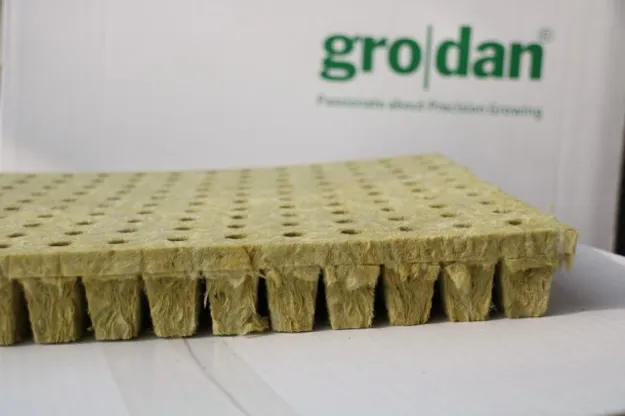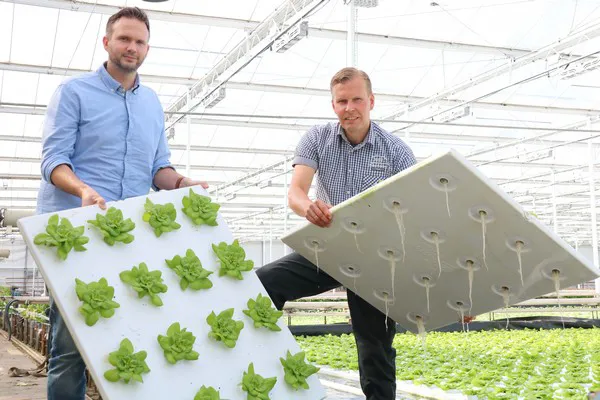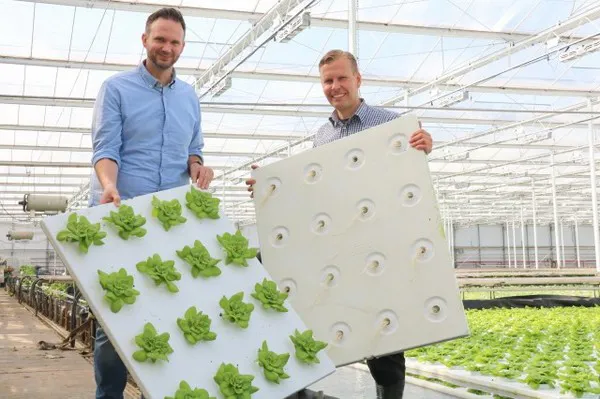At Marck Hydroponics, in a greenhouse measuring approximately 1 hectare, around 2 million lettuce and pak choi plants are grown in a hydroponic floating raft system every year. Since mid-2019, Arthur Marck and his brother Theo have been cultivating these crops in this growing system. After a search with different growing media, they are currently using Grodan stonewool plugs.

Three years ago, Marck from Nieuwerkerk a/d IJssel, the Netherlands, was introduced by an acquaintance to hydroponic lettuce cultivation, which appealed to him.
The IT specialist with a horticultural background, who at that time was still employed full-time at Lely in Maassluis, took the plunge and he and his brother founded the company Marck Hydroponics. They used 1 hectare of their parents’ garden to start up the company. He now works as a grower four days a week and continues to work one day a week as an IT specialist at Lely.

Thomas Peters and Arthur Marck
Deep flow technique
Marck chose a DFT (Deep Flow Technique) cultivation system from Meteor Systems. In this system, the leafy greens grow in specially designed plastic floating rafts with regularly spaced holes in which the plants sit, suspended just above the water and from where the roots grow down into the water. “The DFT system fits perfectly in our 8-meter Venlo-style greenhouse."
Marck manages the entire process, from sowing and propagating of the young plants to their subsequent growth in the floating rafts and harvest.
The different coconut and peat 'compost' mixtures that he initially tried were not satisfactory. “The plants suffered from stress, the roots were smothered, and flowing water and water aeration didn’t really help to prevent the root problems. From the very beginning, we had problems with Pythium and Phytophthora, resulting in a failure rate of up to 50%.”
Marck initially chose Salanova one-cut lettuce, grown for the processing market. However, due to the widespread growth problems he was encountering, he also started to grow pak choi. “Pak choi has a lower financial return, but continuing with lettuce alone was equally not a smart move,” comments Marck in relation to the balancing act. “We had fewer root-related problems with pak choi, but the uniformity of the crop still fell short of the requirements of the fresh produce market.”
Stone wool Grodan plugs
The grower was introduced to Thomas Peters from Grodan by its local distributor, Royal Brinkman. “I didn’t think stone wool was a sustainable product, but that was a misconception. As it can be recycled locally, it is actually very sustainable,” says Marck.
On 1 December 2020, Thomas Peters became Grodan’s Business Development Manager. In this role, he supports growers with new crops that can also be grown on stone wool, as is the case here. “I looked at how Marck could achieve better cultivation results by focussing on improving the uniformity and eliminating crop failure caused by the root problems. I suggested we try our square stone wool plugs as these would fit nicely into the holes of the floating rafts. Air is essential for good root growth, and as there is sufficient air in the stone wool plugs, the roots are encouraged to enter the water.”

Growing support
Since March 2021, Peters has been supervising the stone wool, overseeing operations from sowing to harvest, the aim being crop optimization. “Cultivation of both crops is faster and more effective, and the failure rate is now almost zero,” Peters concludes.
The test crops were successful. The grower is now simply conducting further tests to perfect the system and he will then decide whether he will continue to grow half pak choi/half lettuce, or whether lettuce alone will be grown. “We will know more in six months’ time.”

 Grodan
Grodan